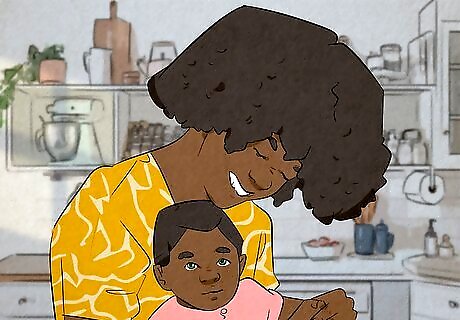
views
- Eros (eh-rows) is a type of love characterized by feelings of sexual attraction and an intense, passionate desire for someone.
- Characteristics of eros love include things like feelings of euphoria and an intense desire to be physically and emotionally connected to the person you find attractive.
- The concept of eros and physical love is referred to throughout the Bible as the love between married couples.
What is eros love?

Eros (eh-rows) love is feelings of sexual desire and passion. This kind of love is filled with lust, passion, and romance. Many consider eros to be the type of love closest to the modern-day concept of romantic love, and its most defining characteristic is the presence of sexual desire. Some describe eros as being the emotions and sensations felt in the very early stages of love, characterized by physical and sexual attraction, idealization, and nervousness. The Greek philosopher Plato also described eros as one’s desire to seek an ideal beauty that transcends the individual and reminds people of the beauty that exists in the world. The Greek god Eros was the equivalent of the Roman god Cupid, the god of love. The word “erotic” originates from the word “eros.”
Characteristics of Eros Love

Sexual attraction This is the defining characteristic of eros love. If you’re experiencing eros, you may feel a strong desire to interact in a sexual manner with the person you’re attracted to. However, the sexual desire felt with eros is often likened to feelings of lust; intense feelings of sexual and physical attraction that often don’t last more than a few months. For example, if you’ve just started dating someone, you might feel sexually attracted to each other even before you really get to know one another. Of course, sexual attraction can develop into a deeper romantic love as people get to know one another better and show more commitment to each other.

Idealization When it comes to eros and romantic love, people often view the person they’re attracted to as perfect and flawless. They highlight their partner’s positive qualities and might neglect to see the negatives. To them, the person they desire is unique and irreplaceable. Idealization is often seen in the very beginning of romantic relationships before partners really get to know one another. For example, if you have a crush on someone, you might consider the other person to be absolutely perfect even though you haven’t interacted with them much. Unfortunately, idealization can often lead to a person having unrealistic expectations about their partner or their relationship as a whole.

Physical dependency When you feel eros love, you often want to be around the person you desire as much as possible. You likely want to feel connected to the other person in as many ways as possible, and being physically close to each other is just one way to strengthen your bond. For example, you might constantly want to hang out with your significant other and plan dates together as often as possible. When you’re away from the other person, you might miss them a lot and want nothing more than to be with them as soon as possible.

Euphoria When you’re feeling eros love toward someone, you might feel incredibly happy anytime you see them or when you get to spend time with them. You might feel a rush of excitement any time you see them or even just hear their name being mentioned. And when you’re together, you might instantly feel comforted and happy. Euphoria also brings along feelings of security. When you’re with the person you experience eros love with, you might feel like you can let yourself go and be carefree around them since you know they’ll keep you safe.

Nervousness It might feel like butterflies are swirling in your stomach when you see the person you’re attracted to. You might break out into a nervous sweat when you’re near them or find yourself blushing a lot more than normal. Even if you don’t know them that well yet, the person you feel eros love for can still elicit plenty of physical responses, and this is often what people go through when they’re experiencing infatuation and are in the early stages of romance.

Risky behavior Sometimes, eros and romantic love can blind a person to certain dangers as they pursue the object of their affection. In fact, some ancient Greeks even considered eros to be one of the most dangerous types of love, since people are often willing to take many risks out of the passion and desire they feel for someone else. For example, you might be willing to quit your job and move to a completely different city for the person you love. Even agreeing to go on a date with someone you don’t know all that well can be a risk, but you might still do it anyways because you feel attracted to them.

Emotional connection This kind of connection happens when people feel truly aligned with one another and are able to feel bonded in a way that goes beyond just surface-level attraction and sexual desire. While eros is heavily characterized by the presence of sexual attraction, it’s also marked by intense feelings of passion. This passion can translate into a desire to know a person on an even deeper level and form a strong emotional connection. For example, you might be willing to open up about your innermost thoughts and emotions so that your partner can better understand you. Emotional connections also form when people spend quality time together and listen to each other with their undivided attention.

Commitment While brief feelings of lust and infatuation are traits of eros and romantic love, commitment and a passionate desire to be with another person for a long time are also important characteristics. At its core, eros is all about passion, and that passion can turn into commitment as you get to know another person on a deeper level. Many people consider eros to be the type of love found between married couples. Eros is also described simply as a passionate desire for something, which, for some people, might mean a desire to be with a person in a committed relationship.
Eros Love in the Bible

Eros likely refers to physical love within marriage in the Bible. The Song of Solomon in the Old Testament shows how eros love was meant to be celebrated when in the context of marriage. And while the term eros is never explicitly mentioned in the New Testament, there are some verses that allude to the idea of physical love being exclusive to marriage. These verses are: “Let marriage be held in honor among all, and let the marriage bed be undefiled, for God will judge the sexually immoral and adulterous.” —Hebrews 13:4 (English Standard Version) “Do not deprive one another, except perhaps by agreement for a limited time, that you may devote yourselves to prayer; but then come together again, so that Satan may not tempt you because of your lack of self-control.” —1 Corinthians 7:5 (ESV)
Other Types of Love

Philia (fill-ee-uh) This type of love is the kind found between friends. Unlike eros, philia usually doesn’t involve feelings of sexual desire and more so centers around mutual respect, trust, and companionship. Plato argued that the best kind of friendship forms when eros turns into philia. In other words, when sexual desire becomes a deeper feeling of companionship.

Agape (uh-gaw-pay) This is the love one feels for the entire universe, the people within it, nature, and God. Agape is often closely tied to Christianity, and it’s very similar to the modern concepts of altruism and charity.

Storge (store-gay) Love for one’s family is known as storge. This term most often refers specifically to the bond between parents and children. Many describe storge as being a natural love. In other words, families feel naturally connected to one another and love each person unconditionally. On the other hand, types of love like eros and philia are somewhat conditional. With eros, you likely only feel attraction and desire for someone you find physically attractive. For philia, a sense of camaraderie and understanding is needed to form a strong bond.

Ludus (loo-dus) This type of love is best described as playful and flirtatious. Like eros, ludus is often marked by lust and infatuation, and it’s usually present in the very early stages of a relationship. However, unlike eros, ludus usually doesn’t evolve into a deeper romantic love. Friends with benefits is one example of ludus love.

Pragma (prag-muh) Love born out of a sense of duty is known as pragma. This type of love puts much more emphasis on practicality rather than romantic or even sexual attraction. Many often cite arranged marriages as an example of pragma. Even if the people getting married don’t feel any passion or desire toward one another, they may still stay together out of a sense of duty.

Mania (main-ee-uh) Maniacal love is characterized by obsession and possession. It can be rather dangerous, and a person who experiences maniacal love often becomes infatuated with another person and can be extremely jealous and possessive. Please note: Mania is also an official medical condition that causes a person to experience extreme highs and changes in their emotions, energy, and mood.

Philautia (fill-law-tee-uh) This type of love forms when a person loves themselves. When philautia becomes unhealthy, it can turn into hubris and an inflated sense of self. However, a healthy level of philautia allows a person to be confident in themselves and their abilities and nurture healthy self-esteem.




















Comments
0 comment